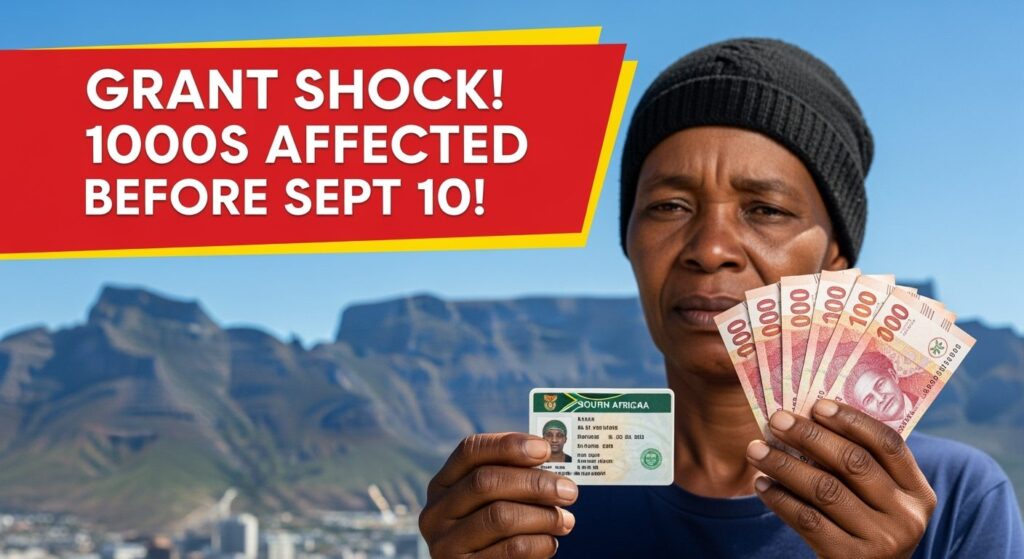SASSA grant suspensions: In a development that has sent shockwaves through communities across South Africa, thousands of beneficiaries have suddenly found themselves without their crucial social grants as SASSA (South African Social Security Agency) has implemented widespread payment suspensions ahead of September 10. I’ve been following this situation closely, and the impact on vulnerable citizens has been immediate and severe. If you’re a grant recipient or know someone who is, you might be wondering what exactly is happening with these unexpected suspensions and what steps can be taken to address the situation.

What Caused the SASSA Grant Suspensions?
The current wave of SASSA grant suspensions appears to be part of the agency’s ongoing verification processes designed to eliminate fraud and ensure that grants reach only eligible beneficiaries. According to information available, SASSA has intensified its verification procedures ahead of the September 10 payment cycle. This includes cross-checking beneficiary information against other government databases, verifying identity documents, and reviewing income declarations. The agency has previously stated that such measures are necessary to maintain the integrity of the social grant system, which serves as a lifeline for millions of South Africans.
However, the scale of these suspensions suggests something beyond routine verification. I’ve noticed that many affected beneficiaries report receiving no prior warning about potential issues with their grants, leaving them completely unprepared for the sudden loss of income. Have you checked if your grant status has changed recently? It might be worth verifying even if you haven’t received official communication from SASSA.
Why Thousands Are Affected by the Suspensions
The widespread nature of these SASSA grant suspensions points to a systematic review rather than case-by-case investigations. The timing ahead of September 10 suggests this may be part of a quarterly or bi-annual verification drive. From my analysis, several factors appear to be driving these suspensions. First, there’s the ongoing pressure on government finances, which has led to stricter enforcement of eligibility criteria. Second, SASSA has been implementing new technological systems to detect inconsistencies in beneficiary data, which may have flagged numerous accounts simultaneously.
Additionally, there have been reports of system errors affecting legitimate beneficiaries, resulting in unintended suspensions. This technical aspect shouldn’t be overlooked, as previous SASSA system updates have occasionally resulted in temporary disruptions. The combination of intentional fraud prevention measures and potential technical glitches has created a perfect storm, leaving thousands without their expected SASSA grant payments just when many families are preparing for month-end expenses.
How to Check Your Grant Status
If you’re concerned about your SASSA grant status, there are several ways to verify whether your payment has been suspended. I recommend starting with the official channels to get the most accurate information. The SASSA grant suspensions have created significant anxiety, but being proactive can help you address any issues quickly.
- Visit your nearest SASSA office with your ID document and grant reference number
- Call the SASSA toll-free helpline at 0800 60 10 11
- Check your status online through the SASSA website or mobile app
- Inquire at your regular payment collection point with proper identification
When checking your status, be prepared to provide personal details to verify your identity. If you discover that your grant has indeed been suspended, request specific information about the reason. Understanding why the suspension occurred is crucial for taking the appropriate steps to resolve the issue and potentially have your SASSA grant reinstated before the next payment cycle.
When and How Payments Might Resume
For those affected by the SASSA grant suspensions, the most pressing question is when payments might resume. Based on previous similar situations, I can share that the timeline varies depending on the reason for suspension. If your grant was suspended due to a verification issue that you can quickly resolve (such as providing updated documentation), payments might resume in the next cycle after September 10. However, if more complex investigations are required, the process could take longer.
SASSA typically requires beneficiaries to submit an appeal or reconsideration request if they believe their grant was wrongfully suspended. This process involves completing specific forms and providing supporting documentation to prove continued eligibility. I strongly advise affected individuals to act promptly rather than waiting for automatic reinstatement, as proactive engagement with SASSA often leads to faster resolution of suspension issues.
Real Impact on Communities
In the Eastern Cape province, a community center that usually buzzes with activity on grant payment days was eerily quiet this week. Nomsa Mbeki, who runs a small soup kitchen that depends partly on donations from grant recipients, told me that many elderly people in her community were in tears after discovering their SASSA grant suspensions. “They came to me asking for food because suddenly they had nothing,” she explained. “Some have grandchildren who depend on this money for school supplies and food. What are they supposed to do now?” This scenario is playing out in communities across the country, highlighting the real human cost of these administrative decisions.
The SASSA grant suspensions ahead of September 10 represent a significant challenge for thousands of South Africans who depend on this social safety net. If you’re affected, I encourage you to use the resources mentioned above to check your status and take appropriate action. Remember that you have the right to appeal if you believe your suspension was made in error. As this situation continues to develop, I’ll be monitoring for any updates from SASSA regarding the timeline for resolving these suspensions and the resumption of normal payment schedules.




